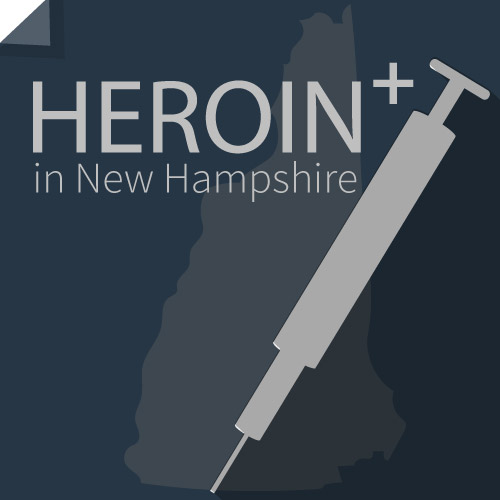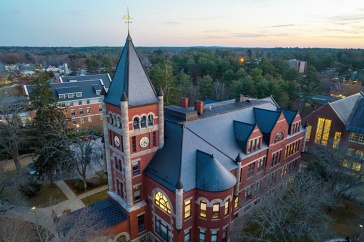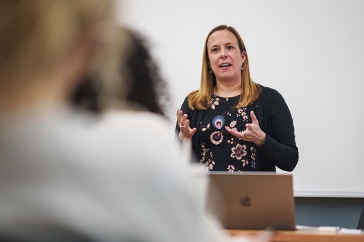
This is the second article in our series exploring how UNH alumni, faculty and students are tackling the heroin and opioid epidemic that has hit New Hampshire and many other parts of the country.
This story takes a look at the Raymond Coalition for Youth (RCFY), which got off the ground with the help of UNH Cooperative Extension. The coalition helps prevent addiction by engaging youth and teens in positive activities, and the town has seen a reduction in substance abuse among youngsters since the group opened its doors in 2004. Today, RCFY maintains a strong connection to UNH Cooperative Extension, whose youth and family specialists deliver RCFY training and programming.
In 2002, Raymond, a small working-class town east of Manchester, had the highest rate of youth substance abuse in New Hampshire. UNH Cooperative Extension, in partnership with the town, had just completed a Teen Assessment Project survey that identified issues facing local at-risk teens. Many in Raymond knew something needed to be done.
Celeste Clark, a concerned parent of four sons, turned to Rick Alleva for help. Alleva, a youth and family field specialist at Cooperative Extension, has devoted much of his professional and personal life to positive youth development and substance abuse prevention. During the next two years, he worked closely with Clark — writing grants, applying for nonprofit status and providing technical assistance and leadership training — to help establish and build a community coalition for Raymond’s youth.

Since opening in 2004, Raymond Coalition for Youth (RCFY) has made a significant impact in the community through outreach programs and educational forums that create connections to community, teach leadership and good decision-making, build self-worth and confidence and provide stability.
“If we go out into the community with only an anti-drug message, the kids won’t listen,” says Clark, who is RCFY’s executive director. “But if we can engage and empower our kids and make them resilient, they will be less likely to abuse alcohol and drugs like opioids. It starts at a young age and is nurtured throughout a lifetime.”
One of the most popular RCFY programs is Youth Action. Students from Raymond’s middle and high schools develop and lead events that encourage positive and healthy behaviors among both their peers and children in the elementary school.
They also reach out to the adult community through their twice-yearly involvement in Sticker Shock, a New Hampshire Liquor Enforcement Buyers Beware program aimed at making sure adults know it’s illegal to buy alcohol for anyone under 21.
“RCFY is one of the most dynamic and successful coalitions of youth, parents and service providers in New Hampshire,” says Alleva, who, as part of RCFY’s ongoing partnership with Cooperative Extension, develops the organization’s after-school programs and teaches leadership skills to Youth Action participants and program staff. He is also a member of RCYF’s board of directors.
“Through positive youth development, RCFY builds on the strengths and assets of young people to help them make healthy choices and avoid risky and destructive activities such as substance abuse.” Alleva says.
Raymond no longer leads the state in youth substance abuse, and the number of youth positively affected by the coalition continues to grow. Clark shares a story about one participant — a teenage girl whose parents struggled with substance abuse. RCFY was a place where she felt safe, understood and empowered. She became an active member of the community, leading an effort to eliminate smoking in Raymond’s school bathrooms and town recreation areas. Today she’s attending medical school in Texas.

UNH Cooperative Extension youth and family field specialist Rick Alleva (center, with hoops) works with Youth Action members during a leadership training.
Even with successes, Clark and Alleva both know there are no quick fixes or simple solutions — especially given the rise of opioid addiction and overdoses in the state. This past year, RCFY sponsored forums on heroin and opiates, and David Salois, the coalition’s board chair and Raymond’s police chief, is outspoken about the need for everyone to work together to combat the crisis.
Recently the coalition received another five-year federal Drug-Free Communities grant, which Alleva considers a “true testament to the positive outcomes that RCFY has effected, including a reduction of youth substance abuse and an increase in youth and adult involvement in their community.”
As far as the work RCFY is doing now, Clark is proud of its role in the overall fight against substance abuse in the state. “It’s such an important story to tell,” she says.
UNH Health Services is hosting a free screening of the documentary “An American Epidemic” on Tuesday, Oct. 13, at 7 p.m. in MUB Theatre II. This event is open to the public. RSVP on Facebook.
















































